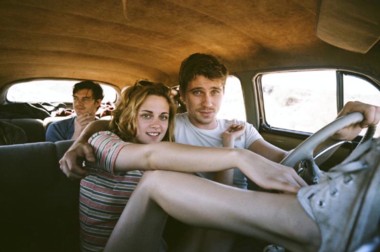I must have been insufferable as a teenager. Bookish from the get-go, I grew up spending a lot of time in my own head, dreaming of the past. I took up smoking and started collecting typewriters, thinking in some vague way that it connected me to the dead authors I idolized. I once took a photo of Bob Dylan to my barber, who laughed at me when I said I liked Dylan’s hair. At least my friends and I were good tippers at the diner where the waitresses humored us in our pretensions.
In those days I carried many a well-worn paperback, but nearly all of them could be traced back in some way to one man: Kerouac. It became something of a game, seeing how far his circle spread; Lowell’s famous son seemed to influence as many authors as teenagers. Not all those books were all that good—heck, not all of Kerouac’s were, either—but somewhere along the way the cumulative effect was enough to make me realize that I wanted to pursue a life somehow connected to art—to the lifestyle of poetry, painting, and jazz that lit up books like On The Road. And amazingly, it worked, leading in a roundabout way to the very column I’m writing right now.
It’s that early hold on readers that has kept Kerouac, and especially On The Road, relevant to every new generation in a way his followers were not. It’s also what makes any movie adaptation of his most famous work a minefield for potential directors—capturing that sense of inspiration on film is notoriously difficult, and any hint of phoniness will bring down the whole show.
This week, director Walter Salles Jr. (The Motorcycle Diaries) takes on the challenge when On The Road opens at Amherst Cinema. Adapted by José Rivera and produced by Francis Ford Coppola, the film features a mix of well known actors (most noticeably, Kristen Stewart of the Twilight series) but wisely reserves the two lead roles for relative unknowns Sam Riley (as Kerouac’s alter ego, Sal Paradise) and Garrett Hedlund (as Neal Cassady/Dean Moriarty, the man who would change Kerouac’s life). Characters drop in and out of the story as the pair criss-cross the country on hair-raising adventures in pursuit of the pure essence of experience.
The success of it all as a film will likely depend on its viewers’ connection to the source material and their ability to accept (or look past) some of those high-profile casting choices. But Salles might have a bit of an advantage in that he comes at it without the baggage an American director might.
Brazilian by birth, Salles first read Kerouac’s novel while Brazil was under military rule, when there was little press freedom in the country. The book was passed around by the director’s college friends, creating an underground stir that more resembles the dissident samizdat tradition of the Soviet Union than the commercial avalanche of our Barnes & Noble nation. If anything, the era of On The Road—it was published in 1957—might more resemble Salles’ youth than that of many Americans today.
*
Also this week: The Central Park Five, screening at Amherst Cinema at 7 p.m. on Thursday, Jan. 31, finds Ken Burns (Jazz, Prohibition) teaming up with his daughter Sarah and her husband David McMahon to turn a lens on an infamous case of rape, racism, and injustice.
The five of the title were the Harlem teenagers accused in 1989 of committing a shocking rape in Central Park. Convicted on the basis of dubious confessions (the victim, beaten to the brink of death, had no memory of the assault) during a time of high racial tension, the five all served time in prison before a serial rapist confessed to committing the crime himself. DNA evidence confirmed that story, leading to the 2002 vacating of the original convictions.
Jack Brown can be reached at cinemadope@gmail.com.



